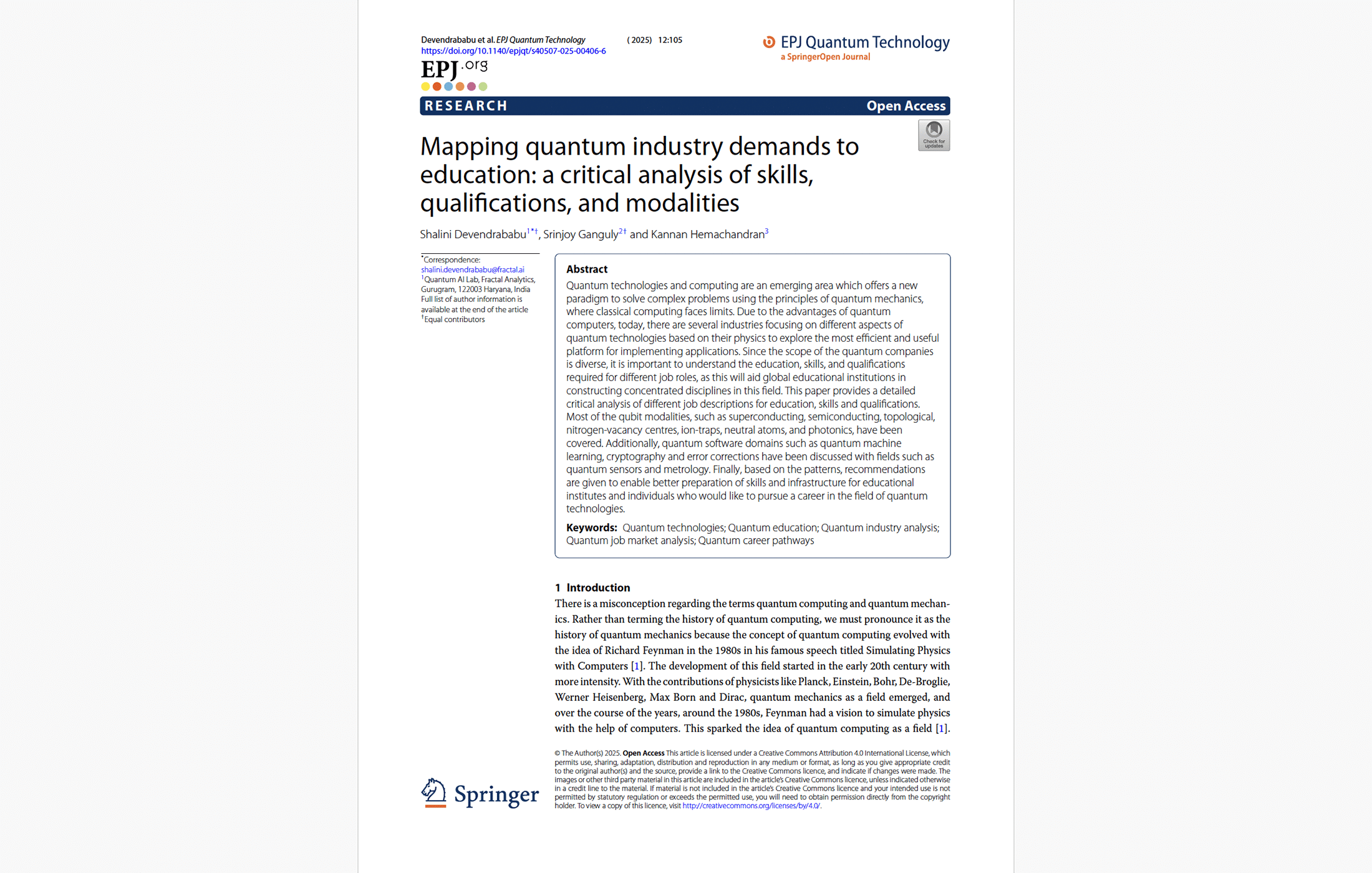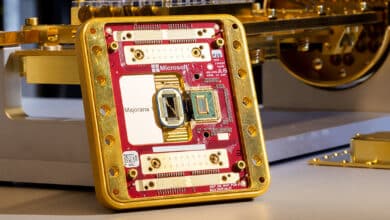New Paper Alert: Mapping Quantum Industry Demands to Education

A new peer-reviewed study – “Mapping quantum industry demands to education: a critical analysis of skills, qualifications, and modalities,” by Devendrababu et al. has just been published in EPJ Quantum Technology (2025). The paper takes a data-driven look at what the quantum technology job market is really asking for in terms of skills, academic degrees, and training pathways. Covering a broad range of quantum domains from hardware (superconducting, semiconducting, topological, ion-trap, photonic, and more) to software (quantum machine learning, cryptography, error correction) and even emerging areas like quantum sensing and metrology, the study aims to inform how educational programs can better prepare students for careers in quantum technologies.
Preparing the workforce for the quantum era is central to my work. In the past I’ve published anecdotal opinion pieces, including “Career Opportunities in Quantum Technologies (No PhD Required)“, but it’s refreshing to see a rigorous study grounded in real job postings – an overdue injection of data into a discussion long dominated by anecdotes and speculation.
A Data-Driven Study of Quantum Job Postings
Between October 2024 and March 2025, the authors collected 90 unique job descriptions from 37 companies worldwide (primarily in the US, UK, EU, Canada, and Australia). These postings span a variety of quantum technology sectors, ensuring coverage of distinct subfields: multiple quantum hardware platforms (superconducting qubits, semiconductor/spin qubits, ion traps, neutral atoms, nitrogen-vacancy centers, topological qubits, photonics), as well as quantum software and theory domains like quantum machine learning (QML), quantum finance, quantum cryptography, and quantum error correction (QEC). (Quantum sensing and metrology were also discussed as important emerging areas, though active job postings in those areas were limited.) Duplicate listings were removed to focus on unique roles, and in a few niche domains with very few current openings (e.g. topological qubits or NV-center jobs), the authors drew on recently filled postings and general expertise to characterize the skill demands.
Methodology
Each job description was read in full and qualitatively coded for any mention of a required skill, academic degree, or qualification. Crucially, they counted each distinct skill only once per posting to avoid over-weighting skills that appeared multiple times in one ad. This yielded a comprehensive list of unique skills mentioned across all jobs. They likewise recorded the required degree level (BSc, MSc, PhD) for each job, along with specific fields of study or specializations sought (e.g. Physics, Electrical Engineering, Computer Science, etc.). Using a summative content analysis approach, the frequency of each skill/degree/qualification was tallied, and the authors computed what percentage of the total mentions each represented. The result is a set of quantitative snapshots, often visualized as bar graphs or pie charts, of the most in-demand skills and credentials in each quantum subfield.
High-level findings
Quantum technology roles are diverse, but not uniformly distributed
Some domains are far more active in hiring than others. In particular, quantum hardware engineering roles and quantum error-correction/cryptography roles dominate the sample, whereas specialized application-area jobs in things like QML or quantum finance were comparatively scarce in the postings. This likely reflects the industry’s current priorities.
Different quantum domains demand different mixes of skills and education
In other words, the quantum workforce is not one-size-fits-all. While all employers look for solid fundamentals (e.g. physics, applied math, and algorithmic thinking) as well as proficiency in general tools like programming and laboratory techniques, each subfield has its own specialized skill set and often its own expectations for the level of academic training.
Not every quantum job posting demands a PhD
The study largely confirms that in many subfields, a Master’s degree or even a Bachelor’s (plus experience) was commonly accepted for industry roles. In my earlier blog post, I argued that in the expanding quantum job market one didn’t need a PhD in quantum physics to build a successful career in this field. You should read the paper to understand the nuance the authors analyzed, but overall the message is consistent with my blog’s takeaway: practical skills and hands-on experience can often carry as much weight as a doctorate for many engineering-heavy jobs.
However, the new study also complicates, or ads nuance to the “no PhD needed” a bit narrative by pinpointing which areas do still heavily favor PhD-level expertise. It turns out that the threshold for entry varies considerably by subfield. In domains that are very research-intensive or at the cutting edge of quantum hardware, a doctorate remains essentially a de facto requirement. For instance, the paper found that for jobs in quantum error correction (QEC) 70% of the postings required a PhD, with only 20% accepting a Master’s and a mere 10% open to a Bachelor’s. Similarly, any role centered on designing novel quantum architectures or fundamental algorithms tends to list a PhD as either required or strongly preferred. The extreme case was neutral-atom quantum computing hardware roles: the authors noted that “PhD (100%) is the only sought-after degree” in the postings they found, given the niche expertise needed in atomic physics and ultra-high vacuum systems.
In summary, Devendrababu et al. provide empirical backing to the idea that many quantum technology jobs are accessible to those without a PhD – especially roles in engineering, software development, and product integration. Their percentage breakdowns put concrete numbers to what my 2024 blog posited: namely, that a solid Bachelor’s or Master’s education, coupled with relevant skills, can qualify you for a large segment of quantum industry positions.
The quantum industry isn’t a monolith; it’s a collection of sub-industries
One of the valuable contributions of the paper is its taxonomy of quantum job “modalities” – essentially, breaking down the quantum workforce needs by technology domain – and detailing the skill sets unique to each. In distilling these domain-specific observations, the big picture emerges: the quantum industry isn’t a monolith; it’s a collection of sub-industries, each with its own “modalities” of qubit or application, and each with a tailored skill profile.
Implications for Education and Curriculum Design
Perhaps the most important question is: How should educational institutions respond to these insights? Both our earlier discussion and the new paper agree that there is a gap between traditional academic training and quantum industry needs, but now we have a clearer picture of what that gap entails. Devendrababu et al. conclude their paper with recommendations aimed at universities, training programs, and even students themselves, to better align the pipeline of talent with the demands of quantum employers. Notably, they advocate for a more flexible and interdisciplinary curriculum structure for quantum education. Rather than expecting every student to get a PhD in physics and then pick up engineering later (or vice versa), they suggest schools should “adopt flexible, modular curricula that pair core quantum science with specialised tracks (hardware, software, sensing)”.
In practice, this could mean a Master’s program in “Quantum Engineering” where all students learn the fundamentals of quantum mechanics and information science, but then branch into concentrations like Quantum Hardware Systems, Quantum Software and Algorithms, Quantum Communications/Sensing, etc., each with targeted courses and lab work. A modular approach would also allow students from different backgrounds to enter and fill in their missing pieces (e.g. a CS major could learn the necessary physics in a crash course, while a physics major could take intensive software engineering modules) – producing graduates with the well-rounded skill sets that the study shows companies want.
To close the skills gap, Devendrababu et al. recommend a multi-pronged approach for educators and institutions, which aligns well with what we’ve observed in the industry:
- Engage students early and make quantum approachable: There’s a lingering perception that quantum science is forbiddingly complex and “only for geniuses.” The authors argue that this mindset must be broken by how we teach quantum topics.
- Leverage online courses and certifications: The quantum community is fortunate to have a growing ecosystem of online learning resources – from MOOCs on Coursera and edX to specialized programs like The Coding School’s quantum courses or vendor certifications (IBM’s Qiskit Advocate, Xanadu’s PennyLane courses, etc.). The study encourages students and professionals to take advantage of these to “add on” quantum knowledge outside formal degree programs.
- Provide hands-on lab experience: Theory must meet practice. A recurring theme in job postings is the need for “hands-on” skills – whether it’s operating a cryostat, building an optical setup, or simply programming and debugging quantum software on actual hardware. The paper strongly recommends that laboratory access be made a mandatory component of quantum education, not an afterthought. Students should get to use real or simulated quantum devices, perform experiments, and work on interdisciplinary team projects.
- Interdisciplinary cross-training: Beyond just adding courses, the mindset of quantum programs should be interdisciplinary. The study mentions incorporating training in control engineering, error mitigation techniques, and cross-disciplinary collaboration as part of the curriculum.
- Keep content up-to-date with industry trends: The quantum field is evolving fast. Curriculum designers should continuously interface with industry (through advisory boards or simply reading papers and job descriptions) to ensure that what they teach aligns with what employers will look for in 2–5 years.
In essence, the new study underscores a call to action, but now with sharper clarity: bridge the lab-to-industry gap by redesigning education around the skills that matter. The take-home message is clear: our community must continue to foster an education ecosystem that produces “quantum-ready” professionals at all levels.
Quantum Upside & Quantum Risk - Handled
My company - Applied Quantum - helps governments, enterprises, and investors prepare for both the upside and the risk of quantum technologies. We deliver concise board and investor briefings; demystify quantum computing, sensing, and communications; craft national and corporate strategies to capture advantage; and turn plans into delivery. We help you mitigate the quantum risk by executing crypto‑inventory, crypto‑agility implementation, PQC migration, and broader defenses against the quantum threat. We run vendor due diligence, proof‑of‑value pilots, standards and policy alignment, workforce training, and procurement support, then oversee implementation across your organization. Contact me if you want help.



